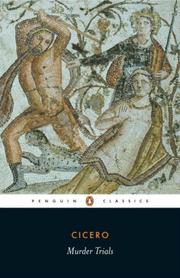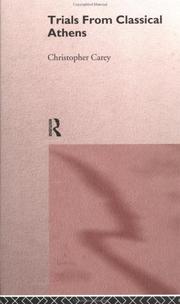| Listing 1 - 10 of 52 | << page >> |
Sort by
|
Book
Year: 1681 Publisher: [London] : Printed by T.H. for W. Thackeray, T. Passenger, J. Clark, and P. Brooksby,
Abstract | Keywords | Export | Availability | Bookmark
 Loading...
Loading...Choose an application
- Reference Manager
- EndNote
- RefWorks (Direct export to RefWorks)
eebo-0018
Book
Year: 1678 Publisher: [London] : Printed by A.P. & T.H. for W. Thackeray, T. Passenger, P. Brooksby and J. Williamson,
Abstract | Keywords | Export | Availability | Bookmark
 Loading...
Loading...Choose an application
- Reference Manager
- EndNote
- RefWorks (Direct export to RefWorks)
eebo-0062
Book
ISBN: 3031445880 Year: 2023 Publisher: Cham, Switzerland : Macmillan Palgrave,
Abstract | Keywords | Export | Availability | Bookmark
 Loading...
Loading...Choose an application
- Reference Manager
- EndNote
- RefWorks (Direct export to RefWorks)
Euthanasia. --- Political parties. --- Parliamentary debates. --- Positioning. --- Arguments.
Book
Year: 1698 Publisher: London : Printed for Anthony Feltom at the foot of the Parliament stairs,
Abstract | Keywords | Export | Availability | Bookmark
 Loading...
Loading...Choose an application
- Reference Manager
- EndNote
- RefWorks (Direct export to RefWorks)
eebo-0095
Wool industry --- Restraint of trade --- Substance of the arguments for and against the bill. --- Ireland --- Commerce
Book
ISBN: 3110619563 3110617919 9783110617917 9783110619560 Year: 2019 Publisher: Berlin ; Boston : De Gruyter,
Abstract | Keywords | Export | Availability | Bookmark
 Loading...
Loading...Choose an application
- Reference Manager
- EndNote
- RefWorks (Direct export to RefWorks)
The endeavour to prove God's existence through rational argumentation was an integral part of classical Islamic theology (kalām) and philosophy (falsafa), thus the frequently articulated assumption in the academic literature. The Islamic discourse in question is then often compared to the discourse on arguments for God's existence in the western tradition, not only in terms of its objectives but also in terms of the arguments used: Islamic thinkers, too, put forward arguments that have been labelled as cosmological, teleological, and ontological. This book, however, argues that arguments for God's existence are absent from the theological and philosophical works of the classical Islamic era. This is not to say that the arguments encountered there are flawed arguments for God's existence. Rather, it means that the arguments under consideration serve a different purpose than to prove that God exists. Through a close reading of the works of several mutakallimūn and falāsifa from the 3rd‒7th/9th‒13th century, such as al-Bāqillānī and Fakhr al-Dīn al-Rāzī as well as Ibn Sīnā and Ibn Rushd, this book proffers a re-evaluation of the discourse in question, and it suggests what its participants sought to prove if it is not that God exists.
God (Islam) --- Proof. --- Arguments for God's existence. --- Islamic philosophy. --- Islamic theology.

ISBN: 014044288X Year: 1975 Publisher: Harmondsworth Penguin books
Abstract | Keywords | Export | Availability | Bookmark
 Loading...
Loading...Choose an application
- Reference Manager
- EndNote
- RefWorks (Direct export to RefWorks)
Classical Latin literature --- -Speeches, addresses, etc., Latin --- Forensic orations --- Trials (Murder) --- Latin orations --- Latin speeches --- Arguments, Legal --- Legal arguments --- Murder trials --- Speeches, addresses, etc., Latin --- Oral pleading --- Speeches, addresses, etc. --- Trial practice --- Forensic oratory --- Murder --- Forensic orations.
Book
ISBN: 1009214500 1108303722 Year: 2022 Publisher: Cambridge : Cambridge University Press,
Abstract | Keywords | Export | Availability | Bookmark
 Loading...
Loading...Choose an application
- Reference Manager
- EndNote
- RefWorks (Direct export to RefWorks)
The Athenian Isokrates (436-338 BC) is well-known for his long career as an educator and pundit; but originally he wrote 'forensic' speeches, i.e. for delivery in court. Six of them survive (five from Athens, one from Aigina), on issues including assault, fraud and inheritance. Here for the first time, after a General Introduction, they are presented and analysed in depth as a self-contained group. The Greek text and a facing English translation - both new - are augmented by commentaries which juxtapose this material with other surviving writers in the genre (and with Isocrates' own later output). In the process, too, the speeches' historical background, personnel, legal context, rhetorical strategies and all other relevant topics are explored.
Forensic orations --- Isocrates --- Political and social views. --- Oral pleading --- Speeches, addresses, etc. --- Trial practice --- Forensic oratory --- Arguments, Legal --- Legal arguments --- Isokrat --- Isokratēs --- Isocrate --- Yi-suo-ke-la-di --- Izokrates --- Ἰσοκράτης
Book
Year: 1606 Publisher: At London : Printed by G. Eld, for Thomas Adams,
Abstract | Keywords | Export | Availability | Bookmark
 Loading...
Loading...Choose an application
- Reference Manager
- EndNote
- RefWorks (Direct export to RefWorks)
eebo-0018

ISBN: 041510761X 0415107601 9780415107617 9780415107600 Year: 1997 Publisher: London: Routledge,
Abstract | Keywords | Export | Availability | Bookmark
 Loading...
Loading...Choose an application
- Reference Manager
- EndNote
- RefWorks (Direct export to RefWorks)
Arguments [Legal ] --- Forensic orations --- Legal arguments --- Plaidoyers --- Pleidooien --- Law, Greek --- Trials --- Droit grec --- Procès --- Débats judiciaires --- History --- Histoire --- Forensic orations. --- Procès --- Débats judiciaires --- Arguments, Legal --- Oral pleading --- Speeches, addresses, etc. --- Trial practice --- Forensic oratory --- State trials --- Procedure (Law) --- Greece --- Athens (Greece) --- Court proceedings --- History. --- Trials - Greece - Athens.
Book
Year: 1659 Publisher: London : printed for Henry Marsh at the Princes Armes in Chancery-lane,
Abstract | Keywords | Export | Availability | Bookmark
 Loading...
Loading...Choose an application
- Reference Manager
- EndNote
- RefWorks (Direct export to RefWorks)
eebo-0018
| Listing 1 - 10 of 52 | << page >> |
Sort by
|

 Search
Search Feedback
Feedback About UniCat
About UniCat  Help
Help News
News